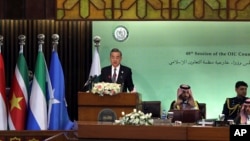A U.S. declaration that China has committed genocide and crimes against humanity against its mainly Muslim minority in western Xinjiang province appears to have had little impact on the 57-nation Organization of Islamic Cooperation, which this week honored Chinese Foreign Minister Wang Yi at a high-level forum.
Invited by host Pakistan, Wang attended the 48th session of the OIC Council of Foreign Ministers in Islamabad as a special guest and spoke at the summit opening. He followed up Thursday with a surprise visit to Afghanistan, whose Taliban-led interim government is eager for Chinese investment and support.
The confluence of events was distressing to the Campaign for Uyghurs, a Washington-based rights group, which condemned both Wang’s attendance at the summit and OIC’s silence on China’s treatment of its Uyghur minority, including mass incarceration in so-called reeducation camps.
“It was appalling to see that Pakistan invited Wang Yi as a ‘guest of honor,’ while Uyghur Muslims do not have the right to identify as Muslims or practice Islam,” Campaign for Uyghurs said on its website.
According to Hasan Askari, an international affairs analyst, Pakistan’s invitation to the Chinese foreign minister at the OIC summit as an observer is part of an OIC tradition that allows the host country to invite high level diplomats from non-member OIC countries.
The U.S. accused China of genocide and crimes against humanity in the Muslim majority Xinjiang region in western China, including forced labor, sterilization of Muslim women and arbitrary detention of more than 1 million Uyghur Muslims in internment camps.
Beijing denies the allegations and says people of all ethnic groups live happily in Xinjiang.
The OIC summit addressed the plight of Rohingya Muslims as well as Muslims in Afghanistan, the Palestinian territories, Jammu and Kashmir and elsewhere, but mostly ignored the Uyghur genocide in China, the Campaign for Uyghurs said.
Only Turkish Foreign Minister Mevlut Cavusoglu brought it up.
“In China, Uyghurs and other Muslims have difficulties protecting their religious rights and cultural identity,” Cavusoglu said at the OIC meeting. “Is it right to ignore the situation of the Uyghurs?"
Turkish politicians are usually the most outspoken defenders of Uyghur rights among Muslim politicians, said Robert Bianchi, professor of international law at the University of Chicago, because of their ethnic and cultural ties throughout Central Asia.
Turkish President Recep Tayyip Erdogan’s party “is particularly sensitive to demands from right-wing nationalists who are junior partners in his governing coalition,” Bianchi said. “He can’t survive without their support, so he often agrees to accept more Uyghur refugees and to speak out against Chinese repression.”
At the summit, Wang said that his country pledged to provide 300 million COVID-19 vaccine doses to Islamic countries.
According to Abdulhakim Idris, executive director of the Washington-based Center for Uyghur Studies, many Muslim-majority countries receive billions of dollars from China in the name of financial investment.
“By receiving billions of dollars from China, these countries are not only forced to remain quiet on the genocidal atrocities against Uyghur Muslims in East Turkistan but also commanded from Beijing to do whatever the PRC wants,” Idris told VOA, calling Xinjiang by the Uyghurs’ preferred name of East Turkistan.
VOA's Urdu Service contributed to this report.









